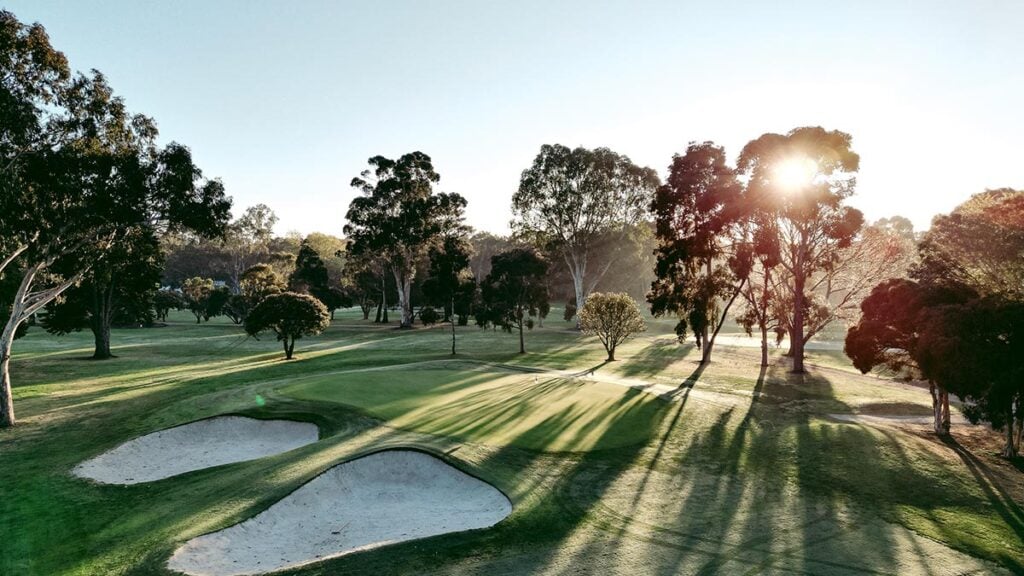CHARLOTTE — Rupe Taylor awoke in a hospital room, immediately registering the restraints binding his arms and legs to the bed. In the chair beside him, his mother sat crumpled, her face hidden in her hands. He didn’t know what had happened as he asked the only question that might forever divide his life into before and after:
“Did I kill someone?”
Among those competing at Quail Hollow this week stand 20 outliers—club professionals whose weathered hands bear the calluses of both playing and working the game at its grass-roots level. For decades, these slots hung like an asterisk on the PGA Championship, a tournament perpetually straining against its position as the least prestigious of the four majors. Critics whispered that in its attempt to honor the membership that represents the game’s backbone, the PGA of America was diluting the competitive integrity of its flagship event. Michael Block changed that narrative at Oak Hill, his improbable charge culminating in a Sunday hole-in-one—his joy and gratitude for the opportunity created a refreshing moment amid professional golf’s bitter divisions.
Block’s journey from club pro to folk hero was a reminder that these are outliers in the best sense. There exists something exciting about watching someone we see every week in the pro shop compete against the world’s best. This week in Charlotte, no club professional embodies this spirited defiance more than Taylor.
The 35-year-old from Charlottesville, Virginia, is competing in his first PGA Championship. Though he didn’t play college golf, he recognized the need to establish a career path and valued the personal connections inherent to the club professional role. After graduating from N.C. State in 2013, he spent time at Kiawah before Virginia Beach National recruited him. Unlike some club professionals who hold the title in name only, Taylor is genuinely dedicated to the job, spending his days giving lessons rather than honing his own game. Just five minutes with Taylor reveals his preference to discuss virtually anything other than himself, and he’s already working to distance himself from any notions of grandeur.
“I’m taking the opposite approach from what Bryson DeChambeau did a few years ago saying Augusta’s a par 67. I’m calling Quail a par 76,” Taylor says. “I shoot 75, I shot one under. I feel like I have to do that based on the conditions, just the difficulty of the golf course. Lower expectations and have fun.”
Such modesty might register as calculated performance. Yet this understated demeanor represents a hard-won perspective forged through painful self-discovery and bitter lessons that permanently altered his understanding of himself and his place in the world.
For nearly half a decade, Taylor existed in an alcoholic haze—fully aware of his addiction, yet powerless to break its grip. He liked to be social, he couldn’t say no to a beer, and couldn’t stop at one. He struggles to pinpoint a single catalyst, describing instead a relentless cascade of deteriorating choices that brought him to the precipice of disaster, where he somehow maintained his balance. Until you face severe enough consequences for your actions, I don’t think anybody is going to accept [how bad it is],” Taylor confesses.
Those consequences eventually came when Taylor, just 23 in 2013, made the decision to drive after a night of excessive drinking, only to regain consciousness under medical supervision.
“I can still kind of picture, just laying there in bed, not physically being able to move, but my head just spinning around me wondering if the worst had happened,” Taylor says about the wreck. “I could see the fear in her eyes for me that like, this is real now, you know?”
Mercifully, the accident claimed no victims beyond Taylor himself, but the legal upshots loomed—DUI charges that carried the prospect of significant jail time.
“I should have been dead,” Taylor says. “I easily could have taken someone else’s life. That was a wake up call I needed, to get my act together.”
A prolonged legal proceeding was unexpectedly beneficial for Taylor, providing time to demonstrate genuine transformation to the court. Drawing strength from his religious upbringing, he enlisted spiritual mentors who guided him through recovery. His commitment to sobriety meant near-daily Alcoholics Anonymous meetings throughout that pivotal year.
“During one session, I found myself seated beside a 46-year-old woman in AA. I projected ahead, thinking, ‘That could be me, 23 years from now, serving as someone else’s sponsor.’ They quickly tempered my enthusiasm, explaining, ‘You can’t simply make that decision. Recovery demands living one day at a time.’ So you try to start to stack days—one day becomes another, 30 days becomes 60, then 90—until eventually the daily struggle begins to ease.”
Golf mirrors recovery in its fundamental philosophy: You can only do your best today and hope to do better tomorrow. Navigating from rock bottom required not only support of loved ones but also the disciplined framework that golf provided—a structured path forward when his life needed it.
“It’s a great way to escape from the realities of life,” Taylor said. “I was able to continue working through all of my issues that I was going through. And because I was able to drive to work, I was able to drive to the golf course, which meant I could play golf. Just to get my mind off of everything and re-channel. ‘What am I going to make out of this situation?’”
His path to redemption was tested when, in the fragile early stages of his recovery, he endured the loss of both his father and grandfather within a mere 10-day span. Revisiting such a painful chapter remains tough, yet Taylor recognizes without his downfall this week’s triumph would have remained forever beyond his reach.
“I think unfortunately we learn through failure in life. You don’t realize it in the moment that you’re making a bad decision, or if you do you keep at it ’cause it feels good in that moment,” Taylor says. “You eventually step back and recognize that like life is very precious. I’m fortunate to get to do the things that I get to do now and I don’t think I would be here if it wasn’t for doing a lot of those things in those periods of time that started getting me back on track.”
Twelve years of sobriety later, Taylor’s life bears little resemblance to those earlier days. Now married and celebrating his first year of fatherhood, he maintains his association with Virginia Beach National while launching his own business—a simulator facility that allows him to teach from home. Though his past remains an indelible part of his identity, he hopes it serves as a roadmap for others to avoid the same mistakes.
Which is why this week is not so much a tournament as a milestone in a life reclaimed. His wife and child have made the journey. His mother and in-laws are here, too. His siblings will join them, but his sister faces her own big moment, receiving her PhD this week. One of Taylor’s former students will be his caddie.
“Then there’s this wave of friends,” Taylor says, his voice rising with excitement. “College buddies, high school friends—saying, ‘We’re coming, not even asking for tickets. We’ll be there.'”
They understand the miraculous nature of his presence here, the blessing of a second chance.
This article was originally published on golfdigest.com



